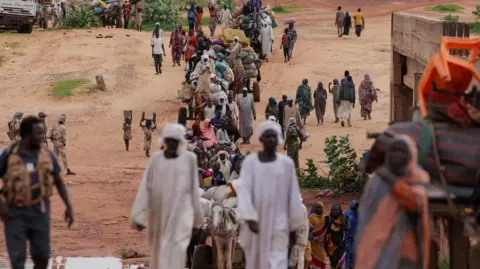In an unprecedented achievement, Algerian author Kamel Daoud has captured France's esteemed Goncourt prize with his novel Houris, which provides a harrowing portrayal of Algeria's brutal civil war during the 1990s. The book narrates the story of Fajr, a female survivor marked by violence, who recounts her traumatic experiences while expecting a child. The Goncourt committee praised Daoud for illuminating the suffering endured during this turbulent era, particularly the female perspective.
Despite the accolades, the response from Algeria has been notably muted. Without an Algerian publisher and facing official censorship, Daoud's success has gone largely unreported in his homeland. His critique of Algeria’s past, shaped by a 2005 law that penalizes the discussion of national tragedies, poses a risk to his freedom — a stark contrast to the freedoms he experienced while writing from France, where he has lived since 2020.
Daoud, who was a journalist during the civil war, recalls the grim realities he witnessed firsthand, claiming that many Algerians, especially younger generations, remain unaware of the civil strife due to its absence from educational discourse. His ongoing criticisms of both the historical narrative surrounding the war for independence from France and the systemic repression of women in Algerian society underline his commitment to confronting uncomfortable truths.
“This book aims to challenge the notion of freedom, especially concerning women, and to encourage Algerians to engage with their complete history,” he stated. Divisive in his home country, some view Daoud as a traitor for his criticism, while others laud him as a literary figure worthy of celebration. In his acceptance remarks, he emphasized the vital need for the freedom to write unhindered, thanking France for providing that sanctuary.
As conversations around Daoud's novel and its implications unfold, they highlight the intersection of literature, memory, and the complex web of Algeria's tumultuous past.
Despite the accolades, the response from Algeria has been notably muted. Without an Algerian publisher and facing official censorship, Daoud's success has gone largely unreported in his homeland. His critique of Algeria’s past, shaped by a 2005 law that penalizes the discussion of national tragedies, poses a risk to his freedom — a stark contrast to the freedoms he experienced while writing from France, where he has lived since 2020.
Daoud, who was a journalist during the civil war, recalls the grim realities he witnessed firsthand, claiming that many Algerians, especially younger generations, remain unaware of the civil strife due to its absence from educational discourse. His ongoing criticisms of both the historical narrative surrounding the war for independence from France and the systemic repression of women in Algerian society underline his commitment to confronting uncomfortable truths.
“This book aims to challenge the notion of freedom, especially concerning women, and to encourage Algerians to engage with their complete history,” he stated. Divisive in his home country, some view Daoud as a traitor for his criticism, while others laud him as a literary figure worthy of celebration. In his acceptance remarks, he emphasized the vital need for the freedom to write unhindered, thanking France for providing that sanctuary.
As conversations around Daoud's novel and its implications unfold, they highlight the intersection of literature, memory, and the complex web of Algeria's tumultuous past.


















